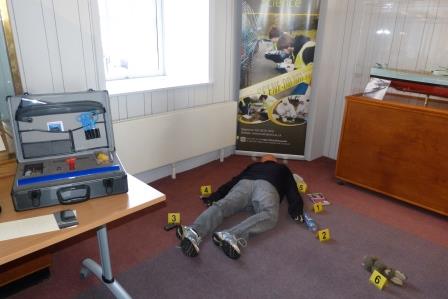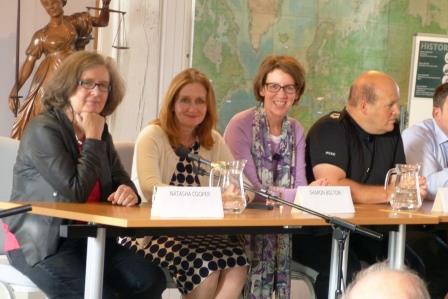On Saturday 2 November 2013, the annual CSI Portsmouth took place at The Princess Royal Gallery at the National Museum of the Royal Navy in the Portsmouth Historic Dockyard. It is the fourth year that this event is now taking place and it is organised by Crime Writer Pauline Rowson whose books are set in and around Portsmouth. As can be expected from such a well-organised event, the room was full of people. As part of the cost of your ticket, you were also entitled to a book. There was a wide selection of books from all the authors present.
CSI Portsmouth is split into morning and afternoon segments. In the morning, the audience were treated to discussions from crime writers Kerry Wilkinson and Pauline Rowson alongside crime experts Dr Alex Allan, Forensic Toxicologist, Triple A Forensics and Mick Ellis, Hampshire Police Drugs Expert. Crime writer M R Hall was also supposed to attend but unfortunately, he could not be there due to illness.
A number of animated discussions took place between all the panellists with the crime experts pointing out (amongst other things) that whilst crime writers made up stories, they were at the sharp end of events.
Mick Ellis stated that he had joined the police force because he had applied for a large number of jobs and he had seen the job application in the newspaper. At the time, the job situation was very bad. Initially he saw it as just a job and not a vocation. He informed the audience that he had joined the drug squad after an altercation that had involved the singer Thin Lizzy. He said that he did not have any regrets about the job as he found it rewarding getting results. Asked about “smart drugs” he explained that they were wrongly known as legal highs and that, they were in fact the biggest problem that they had to deal with now and that the vast number of deaths were due to legal highs. Class A drugs are the highest whilst Class C is considered the lowest. They found that lots of information could be found online in chat rooms. They are also available from wholesalers. He also explained that deaths by solvent abuse was also rife. Mick Ellis also explained that working undercover was quite scary. There are two types of undercover work. Firstly where a relationship is formed with the criminal and secondly, solely observation and surveillance. He confirmed that he had been doing undercover work for more than 20 years and that he had not once been caught. It took a minimum of 15 people to do a full surveillance on someone. The police he explained were very territorial.

Dr Allan stated that he became a Forensic Toxicologist by accident. He had seen an advert for the Home Office Forensic Science Laboratory Service at Alder Marston and had applied. He went on to explain that there were different aspects to his job. He did find his job rewarding but that difficult arose when there were no clues. Dr Allan also explained that expert witnesses did have a code of conduct.
Kerry Wilkinson explained that he was originally a sports journalist. He became a crime writer because he just wanted to do something different to amuse himself. He initially self-published his books and had not really been fussed as to whether or not they would be “traditionally” published. He went on further to explain when asked by Pauline Rowson that he knew what worked for him when it came to writing. He also stated that with his system of writing he initially did notes using Evernote. Kerry Wilkinson in joining the discussion about drugs pointed out that he felt that crime always came back to drugs one way or another and that right from street level drugs were part of society. When asked if he tended to always wrap things up at the end he stated that he did to a certain degree but that also he found that his plotlines could go through all his books. However, time frames were often difficult to manage in crime novels. With regard to his character, Jessica Daniels for her being a police officer is just a job and what drove her is intrigue. His protagonist (like him) did a lot of things on the side to amuse herself. She has no sense of justice as she just sees it as being a job. Kerry also went on to explain that as a writer he felt that it was his job to educate readers. Location was also very important.
Pauline Rowson explained that in her case her police officer had joined the police force for a sense of belonging.
In the afternoon, the panel consisted of crime experts Sergeant Tony Birr, of the Hampshire Police Marine Unit and Brian Chappell former DCI New Scotland Yard (now Lecturer at the Institute of Criminal Justice Studies University of Portsmouth). They were joined by crime writers N (atasha) J Cooper and Sharon Bolton.

Brian Chappell when asked like the panel members in the morning why he had joined the police force he explained that he had seen the advert in London and had applied in the absence of anything else. Asked what he thought was the most dangerous job he undertook; he explained that anything could be considered dangerous. However, the most complex was the rise of firearms and the influence of Eastern Europeans. Brian did confirm that he did in fact miss the cut and thrust of police work, managing risk and the adrenaline that went with it. The contrast was that it was great to be able to look at matters a lot more objectively.
Tony Birr on the other hand initially joined the Royal Navy but on getting married, he then joined the police force. He had no pre-conceived ideas. Three years (2010) ago, he joined the Marine Unit. He explained that there was no “typical” day and that he never knew what he was going to face. A lot of his work is prevention over detection and they had a big presence in the marine community. The team were also involved in major investigations with other agencies. He also pointed out that statistically crime on the Solent was decreasing and that boats and yachts were not actually stolen.
Sharon Bolton explained that she did not set out to be a writer. She took the log scenic route to writing, working in public relations and advertising. Both jobs help to understand what publishers want. In her writing, she likes to have terrified readers by the end of the first chapter otherwise; she does not believe that she is doing her job properly. She is not superstitious when it comes to writing. Asked which comes first plot or character Sharon Bolton explained that for her plot came first along with sub plots but that is not to say that characters are not important. Starting out she does not know much about her characters.
Natasha Cooper on the other hand believed that only special people wrote. She also liked her characters to have flaws. She considers herself to be a control freak and her worst nightmare would be in other people’s power as she was terrified of being controlled. On being asked about her characters, Natasha explained that as she writes a series writing about her characters becomes quite similar.
One of the questions both Sharon and Natasha were asked was their view on the fact that whether crime fiction novels should also seen as social documents. Natasha felt that they should while Sharon felt that they should not.
One of the good things about this event is that you also have access to the museum as well. Also present were officers from Hampshire Police and crime and forensic experts from the Institute of Criminal Justice Studies, Portsmouth University and Triple A Forensics. After both the morning and afternoon sessions, there was ample time for books to be signed and to chat to all the panel members.
CSI Portsmouth is a brilliant and well-run event that is certainly worth attending. The fact that it only takes place over one day does not take anything away from how enjoyable the event is. It is clearly well regarded and Pauline Rowson should be congratulated for organising such a well-attended event.
The date for CSI Portsmouth 2014 is Saturday 8 November 2014 and tickets will be on sale from September 2014. More information about CSI Portsmouth can be found here where you can sign up to the newsletter.
Photos © Ayo Onatade 2013
order abortion pill online
abortion pill buy abortion pills online
women that cheat
online wife cheated
my wife cheated on me now what do i do
link your wife cheated on you
why do wife cheat on husband
site unfaithful husbands
citalopram hydrobromide high
read citalopram hydrobromide and alcohol
pletal y cirugia
click pletal 100 mg precio
free printable cialis coupons
selba.ca discount coupons for cialis
acetazolamide 250 mg tablets
acetazolamide acetazolamide blood brain barrier
naltrexone off label uses
read low dose naltrexone reviews
how long does naltrexone work
link injection for alcohol craving